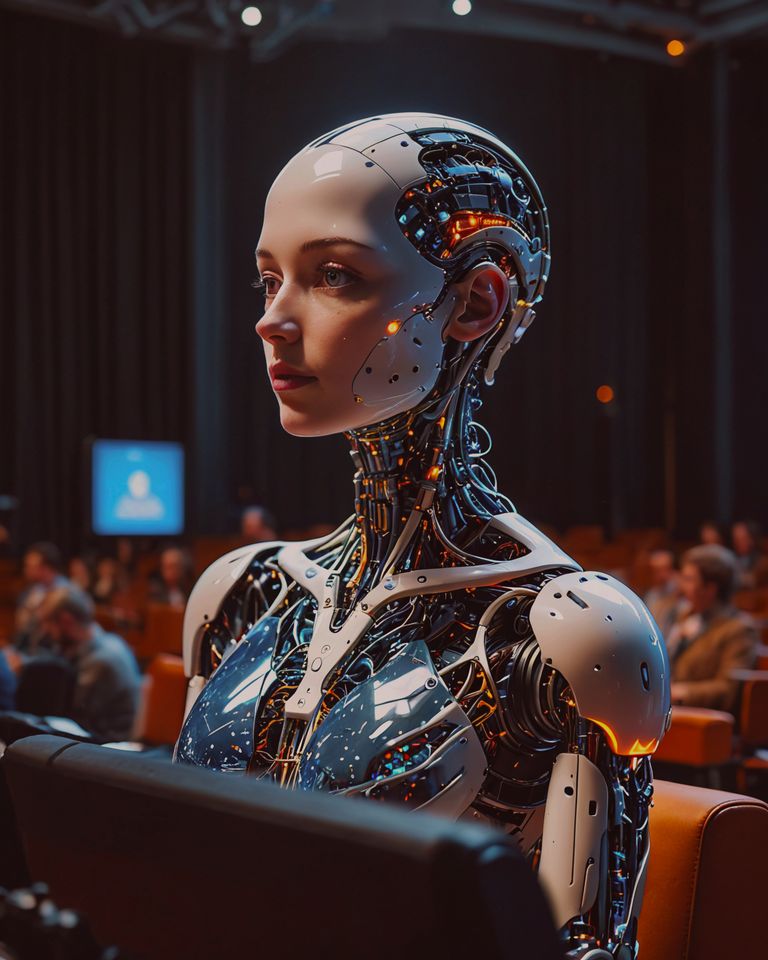
In an auditorium full of expectation, a group of academic specialists gathered to discuss the future of the different branches of psychology in a world increasingly influenced by artificial intelligence and other emerging technologies. The room was full of renowned psychologists and academics, each with their own perspective on how these technologies could transform traditional theories and practices into psychoanalysis, humanism, behaviorism and more.
The debate began with the intervention of Dr. Elena García, a prominent psychoanalyst who argued that artificial intelligence could be a powerful tool to delve into the human subconscious. "AI can help us analyze patterns of behavior and thinking that were previously difficult to detect," he explained enthusiastically. "Imagine being able to identify and treat hidden traumas more accurately and efficiently. However, I also have my reservations about how automating certain therapies could dehumanize the healing process. The emotional connection between the therapist and the patient is fundamental for the success of psychoanalytic therapy."
Then Dr. Carlos López, a defender of humanism, took the floor. "Technology can be a means, but it should not replace human connection," he emphasized with conviction. "Humanism focuses on subjective experience and the search for meaning, aspects that AI cannot replicate. Humanistic therapy is a personal and emotional journey that requires empathy and deep understanding, qualities that only another human being can offer. Although I recognize that technology could facilitate access to therapy, I think it is a mistake to think that it can replace the human essence of our profession."
Dr. Sofía Rodríguez, a behaviorist, presented a more pragmatic view. "Artificial intelligence can help us personalize behavioral interventions, making them more effective and efficient," he said with a smile. "By analyzing large amounts of data, we can identify behavioral patterns and develop more accurate behavioral modification strategies. In addition, AI can automate repetitive tasks, freeing up time for therapists to focus on what really matters: human interaction and solving complex problems."
Finally, Dr. Julián Hernández, an expert in cognitive neuroscience, intervened to talk about how AI is revolutionizing the understanding of the human brain. "The ability of AI to process and analyze large amounts of neuroscientific data is enabling significant advances in the understanding of cognition and behavior," he explained. "However, we must be aware that AI does not replace the complexity of the human experience, but complements it. Cognitive neuroscience can benefit enormously from AI, but we also need to make sure that we don't lose sight of the importance of subjective experience in our research."

As the debate progressed, opinions began to diverge more deeply. Dr Garcia expressed concern about the possibility that AI could be used to control or manipulate people, rather than help them. "What happens if the AI falls into the wrong hands? What guarantees do we have that it will be used ethically?", he asked uneasily.
Dr. Lopez stepped in to support his concern. "AI can be a powerful tool, but we must not forget that behind every algorithm there is a human decision.
If we do not ensure that these decisions are ethical and fair, we run the risk of creating a system that perpetuates existing inequalities and prejudices."
Dr. Rodriguez was more skeptical about these concerns. "I think we are being too pessimistic. AI can be regulated and monitored to make sure it is used responsibly. In addition, the benefits it can offer in terms of efficiency and accuracy are too great to ignore."
Dr. Hernández tried to mediate, but the tension in the room was palpable. "I understand everyone's concerns, but I think we need to find a balance. AI is not inherently good or bad; it depends on how we use it. We must work together to make sure that it is used in a way that benefits humanity, without sacrificing our human essence."
However, the debate ended in a stalemate. Dr. Garcia stood up, visibly frustrated. "I cannot accept that efficiency is prioritized over empathy and human understanding. Psychology is not only a science, it is an art that requires heart and soul." With those words, she left the room, followed by Dr. López, who nodded in silence.
Dr. Rodriguez and Dr. Hernandez remained seated, looking at each other with a mixture of disappointment and determination. "I guess this isn't over," Dr. Rodriguez said, breaking the silence. "The battle for the future of psychology has just begun." Dr. Hernández nodded, and together they decided to move forward, each from their own perspective, in an attempt to shape the future of their discipline in a world increasingly dominated by technology.
Source of the images
Image created with Starryai.
Versión en Español
Microrelato: El Futuro de la Psicología en la Era de la Inteligencia Artificial
En un auditorio lleno de expectación, un conjunto de especialistas académicos se reunieron para debatir sobre el futuro de las distintas ramas de la psicología en un mundo cada vez más influenciado por la inteligencia artificial y otras tecnologías emergentes. La sala estaba llena de psicólogos y académicos de renombre, cada uno con su propia perspectiva sobre cómo estas tecnologías podrían transformar las teorías y prácticas tradicionales en psicoanálisis, humanismo, conductismo y más.
El debate comenzó con la intervención de la Dra. Elena García, una destacada psicoanalista que argumentó que la inteligencia artificial podría ser una herramienta poderosa para profundizar en el subconsciente humano. "La IA puede ayudarnos a analizar patrones de comportamiento y pensamiento que antes eran difíciles de detectar", explicó con entusiasmo. "Imaginen poder identificar y tratar traumas ocultos de manera más precisa y eficiente. Sin embargo, también tengo mis reservas sobre cómo la automatización de ciertas terapias podría deshumanizar el proceso de curación. La conexión emocional entre el terapeuta y el paciente es fundamental para el éxito de la terapia psicoanalítica".
A continuación, el Dr. Carlos López, un defensor del humanismo, tomó la palabra. "La tecnología puede ser un medio, pero no debe reemplazar la conexión humana", enfatizó con convicción. "El humanismo se centra en la experiencia subjetiva y la búsqueda de significado, aspectos que la IA no puede replicar. La terapia humanista es un viaje personal y emocional que requiere empatía y comprensión profunda, cualidades que solo otro ser humano puede ofrecer. Aunque reconozco que la tecnología podría facilitar el acceso a la terapia, creo que es un error pensar que puede reemplazar la esencia humana de nuestra profesión".
La Dra. Sofía Rodríguez, una conductista, presentó una visión más pragmática. "La inteligencia artificial puede ayudarnos a personalizar las intervenciones conductuales, haciéndolas más efectivas y eficientes", dijo con una sonrisa. "Al analizar grandes cantidades de datos, podemos identificar patrones de comportamiento y desarrollar estrategias de modificación conductual más precisas. Además, la IA puede automatizar tareas repetitivas, liberando tiempo para que los terapeutas se centren en lo que realmente importa: la interacción humana y la resolución de problemas complejos".
Por último, el Dr. Julián Hernández, un experto en neurociencia cognitiva, intervino para hablar sobre cómo la IA está revolucionando la comprensión del cerebro humano. "La capacidad de la IA para procesar y analizar grandes cantidades de datos neurocientíficos está permitiendo avances significativos en el entendimiento de la cognición y el comportamiento", explicó. "Sin embargo, debemos ser conscientes de que la IA no reemplaza la complejidad de la experiencia humana, sino que la complementa. La neurociencia cognitiva puede beneficiarse enormemente de la IA, pero también debemos asegurarnos de que no perdamos de vista la importancia de la experiencia subjetiva en nuestra investigación".
A medida que el debate avanzaba, las opiniones comenzaron a divergir más profundamente. La Dra. García expresó su preocupación por la posibilidad de que la IA pudiera ser utilizada para controlar o manipular a las personas, en lugar de ayudarlas. "¿Qué pasa si la IA cae en manos equivocadas? ¿Qué garantías tenemos de que se utilizará éticamente?", preguntó con inquietud.
El Dr. López intervino para apoyar su preocupación. "La IA puede ser una herramienta poderosa, pero no debemos olvidar que detrás de cada algoritmo hay una decisión humana.
Si no nos aseguramos de que esas decisiones sean éticas y justas, corremos el riesgo de crear un sistema que perpetúe las desigualdades y los prejuicios existentes".
La Dra. Rodríguez se mostró más escéptica respecto a estas preocupaciones. "Creo que estamos siendo demasiado pesimistas. La IA puede ser regulada y supervisada para asegurarnos de que se use de manera responsable. Además, los beneficios que puede ofrecer en términos de eficiencia y precisión son demasiado grandes como para ignorarlos".
El Dr. Hernández intentó mediar, pero la tensión en la sala era palpable. "Entiendo las preocupaciones de todos, pero creo que debemos encontrar un equilibrio. La IA no es inherentemente buena o mala; depende de cómo la usemos. Debemos trabajar juntos para asegurarnos de que se utilice de manera que beneficie a la humanidad, sin sacrificar nuestra esencia humana".
Sin embargo, el debate terminó en un punto muerto. La Dra. García se levantó, visiblemente frustrada. "No puedo aceptar que se priorice la eficiencia sobre la empatía y la comprensión humana. La psicología no es solo una ciencia, es un arte que requiere corazón y alma". Con esas palabras, abandonó la sala, seguida por el Dr. López, quien asintió en silencio.
La Dra. Rodríguez y el Dr. Hernández se quedaron sentados, mirándose el uno al otro con una mezcla de decepción y determinación. "Supongo que esto no ha terminado", dijo la Dra. Rodríguez, rompiendo el silencio. "La batalla por el futuro de la psicología acaba de comenzar". El Dr. Hernández asintió, y juntos decidieron seguir adelante, cada uno desde su propia perspectiva, en un intento por moldear el futuro de su disciplina en un mundo cada vez más dominado por la tecnología.
Fuente de las imágenes
Imagen creada con Starryai.